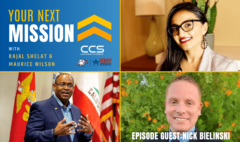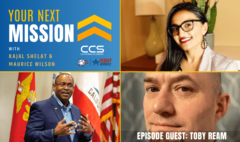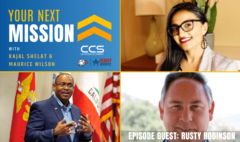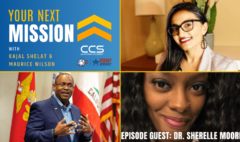From Active Army to legal tech: How one Veteran is building a successful non-technical career in tech
From Active Army to legal tech: How one Veteran is building a successful non-technical career in tech
In this episode of Your Next Mission, our hosts, Kajal Shelat and Maurice Wilson, talk with Army Veteran, Don Lipasek, about his journey from military service to legal tech. Don shares his unusual transition story and gives suggestions on how Vets can find community and comradery in the civilian space. It’s an episode with a lot of twists, turns, and great information. Enjoy!
Your hosts
Kajal Shelat is CCS Learning Academy’s Director of Business Development. She holds a Master’s degree in Business Administration and has 10+ years in the education and professional training sector. She specializes in developing sustainable partnerships and implementing technology training solutions for private and public entities. She uses her passion for education and business to keep our programs current, engaging, and relevant to today’s professionals.
Maurice Wilson is on CCS Learning Academy’s Board of Advisors. A retired Navy Master Chief Petty Officer with 25 years of service, Maurice is the President/Executive Director of the National Veterans Transition Services, Inc. (NVTSI), a non-profit organization he co-founded with retired Rear Admiral Ronne Froman after serving as an advisory member for the Call of Duty Endowment (CODE).
Our guest
Donald Lipasek is an Army Veteran with 14 years of service. He has served in multiple sales roles since leaving the military in 2001. He’s known for providing excellent customer service and his ability to problem solve. He’s currently the ProLaw Customer Success Manager for Helm360, an international legal tech provider. He keeps ties with the military through the Veteran Golfers Association and the American Legion.
Transcript
Kajal: I’m here with Maurice Wilson, a retired Master Chief Petty Officer with 25 years of service. Maurice is the president and executive director of the National Veterans Transition Services, Incorporated and REBOOT, a nonprofit organization he founded.
Today on the show, we welcome Donald Lipasek, who served in the Army for 14 years as an electronics technician and combat engineer before transitioning to his career in sales. He’s currently a Customer Success Manager for Helm360, a sister company to CCS Learning Academy that focuses on the legal technology sector. We’ll learn his story of transition from troubles to triumphs and hear what hard-earned advice he has to give to Veterans who are planning that transition back into the civilian sector. And now onto the show.
Hi Donald. Hi Maurice. Welcome to our ninth episode. This is our ninth episode. Can you believe that?
Maurice: Great. All right. Time flies when you’re having fun.
Kajal: Exactly! We’ve had some really great guests and I’m so happy to have both of you back on the show and Donald, love to get to know you more, get our listeners to know you as well.
Nearly two-thirds of Veterans say they face difficulty transitioning into the civilian sector and civilian life, and this podcast is about helping Veterans find their identity after service and hopefully offer some guidance, offer some advice, some tips, some tricks. Some things that you both have had in your past experiences. And guide individuals as they listen and hopefully they can learn a few things.
So super happy to have you both. Is it Donald or Don?
Donald: I go by Don. Donald is my get in trouble with my mom name.
Kajal: Okay, perfect. Well, Don, tell us a little bit about your history, maybe childhood and what got you thinking about getting into the service and we’ll go from there.
Donald: Well, back in high school, I knew I wasn’t ready to go to college. I knew from the get-go. My senior year, I didn’t go to class much and I only had to pass one class. What I should have done was just gone in the summer, taken that class and been done. It made my decision really easy. I had two full-ride scholarships to go play golf and I turned them both down. I joined the Army right out of high school. I took a couple month break. I joined the Army September 23rd, 1986. So back when Ronald Reagan was the president. Hard to fathom that at this point. It wasn’t a hard decision. I just knew I wanted to do it. I really did. And I didn’t want to have to rely on my parents to take care of me when it comes to college and all that.
Kajal: Perfect. Walk us through your military career. What happened, where did you transition into?
Donald: This could be a bit lengthy. I joined in 1986, went to basic at Fort Leonard Wood, Missouri. My whole family is originally from Southeast Kansas. It was a shock when I got off the cattle car. You had drill sergeants screaming in your face. They don’t do that anymore.
I was at Fort Leonard Woods right up to Christmas and then I went to Redstone Arsenal in Huntsville, Alabama for my AIT, which is advanced individual training. I was there for almost a year. I worked on the Pershing II missile system. I was an electronics technician on a nuclear ballistic missile. That’s the missile that brought the Russians to the bargaining table with their intermediate-range nuclear forces treaty back in 1990.
I was in Europe when, the Berlin wall came down. When they signed the treaty, they did away with my job. So, I didn’t have a job. I didn’t want to sit around and wait to go to another school so I got out. I transitioned, went to college, got a full-time job to support my soon-to-be-wife and children. I had a child on the way.
I didn’t have any issues transitioning because I just had to go to school. I had to work to support my family. It wasn’t a hard transition. During those four years, I was also in the National Guard as well as a combat engineer. I never finished college. I went back on active duty in January of 1994. I went to Fort Jackson, South Carolina and retrained to get a new MOS. I went in as an administrative specialist. I was an E-4 and I was an E-5 in the National Guard. They cut me back to E-4 once I got done with school.
I went to Fort Drum, New York in upstate New York 10th Mountain Division. and all we did was deploy. I went to Operation Uphold Democracy in Haiti for six months. When we got back, I had a son who was born at Fort Drum. The two years that I was there, I got to see him for about two months.
I volunteered to go to Korea to get out of Fort Drum so I could have choice of assignment coming back. I was in Yongsan in Seoul, Korea in the 18th Medical Command. Had a great job there.I worked directly for a Lieutenant Colonel. I was his report to survey NCO. It was pretty fun.
When I came back, my wife showed up at the airport with my three boys. She was pregnant and couldn’t have been mine. That made it easy for me to walk away from that. I still supported my kids and I got stationed at the Military Entrance Processing Station in Phoenix as the Transportation NCO and got to see my kids whenever I wanted. I was in Korea from 1996 to 1997. In 2001, I was getting ready to reenlist and go to my next assignment.
Then I got a piece of paper in the mail saying that my ex-wife tested positive for methamphetamines, which made it easy for me to give up my career, even though I didn’t want to, and fight her for custody of my children. I ended up getting sole custody of my kids after I got off active duty. Originally, my wife had sole custody of them because I was in in the military. Her drug use made it a very easy decision for me, even though I, I wish I could have finished my last, six years on active duty and got that retirement that I really deserved. I just didn’t get a chance to do it.
Kajal: Wow. It seems like you’ve been through a lot of different, uh, ups and downs on the personal, level. Seems like you were able to overcome that.
Even though you didn’t necessarily want to transition out yourself, you had to, for the sake of your kids. Tell us a little bit about that. You know, from a professional standpoint, what were you going through in that moment? I know a lot of heavy burdens for the family situation, but also what were you thinking of? Okay. What do I do next? What was your mindset at that point?
Donald: Thank God you don’t have to rely on yourself a lot if you have family and friends, I didn’t have any family in Phoenix, but I had a lot of friends and a lot of friends who, I guess you could say friends in high places. When I got out, I was on terminal leave and I started a new sales position with Sparkletts bottled water because my best friend’s stepfather – it’s not what you know, it’s who you know sometimes – got me my first job in 2001 when I had to transition out of the military.
Kajal: So, you transitioned because you knew somebody in a sales role, which is interesting
Donald: Right, and I knew nothing about sales.
Kajal: Tell us a little bit about that. And you know, hear a little bit more about your journey and this organization you worked for previously.
Donald: Okay. I got into sales and it was a route sales position where I drove a big truck, had five-gallon bottles of water, three-gallon bottles of water, half liters, one liters, etc.. We sold everything and we had coolers on our trucks. It was our responsibility to build our routes and to manage our customer base. I got to know my customers down to their kids’ birthdays, their dog’s names. If you can do that as a salesperson, those people will never, ever leave you. You are part of their family. And that’s what I’ve always used in my sales background, because you know, after doing the water sales for 10 years, my lower back started to give me problems. You can’t haul two tons of water a day for 10 years and not have any issues.
My boss at Sparkletts left and he went to this company called Z Medical. They did first aid and safety. He told me, “I hear you’re, you’re having issues. I got a position for you. I’ll guarantee you this salary for the first two years until you can build this territory. I know you’re good at it.” So, I took the position with Z Medical and within two years, Z Medical got bought out by Cintas first aid and safety. If you know anything about Cintas they like to buy up businesses.
From Z Medical I went into Cintas and used the same principles that I used when I was with Sparkletts and with Z: get to know the customer, get to know the person who is responsible for paying the bills and know something about them, about their family, about their business as well and they’ll never leave you. I’ve never had a customer that left me because of me. It was because of something extraordinary or they were closing a business or they just couldn’t afford it anymore. I’ve never had someone leave because someone else came in and undershot me. They always would talk to me and say, “Hey, can you do this?” If I could match it, I’d match it. If not, then I’d have to say, “I really can’t, but you can bank on me, you know, whenever you need something, I always have it for you.”
So was a pretty easy transition. Almost four years ago now, my wife told me that I could quit Cintas My dad had his third heart attack and we would move to Southeast Kansas where my family is from, buy a house and be close to my family. She let me quit working for three years. I didn’t have to work at all and just spent time. with my dad, played golf, and had a great time.
My spouse was a sales manager. Now she’s more of a consultant and, Sue Mikelsons with Helm asked her if I would be interested in an interview. And I said sure, why not. Sue interviewed me and she liked me and she hired me. with no legal background. Just a sales background. And the rest is history.
Kajal: Perfect. I loved the story because from every position outside of the of the military it’s about who, you know. I’d love to talk about, making those connections with people, getting out there and understanding who are your resources around you that can help. because not everybody will have the same transition story as you do or the next person or the next person or the next person. Everyone has their story and different ways of transitioning. We’ve talked a lot about knowing your resources, knowing who you can connect with and what is out there and maybe even putting yourself out there as well as you transition to find those opportunities.
Maurice: Don, thank you for sharing your story first and foremost. I really, appreciated hearing about what you went through. And Kajal is right. Every one of us goes through something different. My experience is going to be different from yours and pretty much everyone else out there because we all have a unique, independent story.
But we all have something very much in common, which she also mentioned. We go through a couple of what I call life’s phases as we begin to reinvent ourselves. What’s really interesting about transitioning is that you still have to deal with life. As you pointed out, you went overseas, you had to come back, you had to deal with the kids, the wife, several other things. So, while you’re trying to reconstruct your world, you still have to live in the present. That’s no small task by any measure.
At the same time, you’re starting all over remaking, reinventing. As Kajal said, you’re creating that new identity. You’re finding that new purpose and passion. You’re finding the fit. What you were doing in the military fit. You had the team, you were comfortable, you had your mojo going. Then you’re out of the military. Now you’re in a completely new environment. You’re starting all over.
Can you tell us about, how you ebbed and flow through the phases? We’ll come back to what Kajal said, which is you have to have some kind of a network. I usually ask the question: What do you really need to be successful in your civilian life? It’s interesting the response I get. But before I give you the response, can you answer those questions?
Donald: The one thing I miss from the military is the camaraderie. In the civilian world, it’s dog-eat-dog. The teamwork, the “Hey, I got your six, you got my six,” mentality, you don’t find that in the civilian world, unless you’re working with someone who is a Veteran as well. There’s not a lot of businesses out there that are Veteran-owned. Everybody wants to be number one in sales, everybody no matter where you’re coming from. I don’t want to ever be mediocre. I want to be number one.
Maurice: Do you feel like the military prepared you for the difficulty of surviving in the civilian sector?
Donald: Yes, because in the military you’re not always given the best hand or the best equipment for that matter. Things doen’t take care of themselves: your weapon doesn’t clean itself, your vehicles don’t clean themselves. If you take care of the things you own, they’ll last forever.
Maurice: Yeah. You have to make it all happen. I know exactly what you’re talking about. Would you say that the difference between civilian and military is that there’s a greater emphasis on the people in the military? You cited things like camaraderie, teamwork, got your six. There seems a heavy investment in the people in the military. We want to make sure that your life is pretty much functioning and up to par versus on the civilian sector where’s there’s more emphasis on the product. Would you say that is the case?
Donald: The product and the business. If you don’t perform as a salesperson, how can the company grow? How can the products get to the customers? In the military, in some instances it’s life or death. It was very easy to learn that in the military, teamwork is everything. At some points in my civilian career, it was really hard because there isn’t teamwork and when you need help from somebody, nobody wants to help. You almost have to beg some people to help. It shouldn’t come to that.
Maurice: In the military, that’s part of the training scenario. When you first come in the military, you go through this inculturation process, which again, the big investment is more in the people in terms of the culture. How you fit, how you belong, how you become part of the team, part of the mission. Then after you have been processed and programmed for service, the military focuses on the skills training. Which is a whole different mindset. A very unique and very different environment.
When joining the civilian world, you have to adapt and adjust your way of thinking so you can fit in. Again, that’s one of the phases of finding your fit. The military basically walks you through fitting in, but in the civilian world, you have to fit yourself in because the emphasis is more on the business or the product, not necessarily on developing you. I think that’s the unique difference between the two environments or worlds.
Donald: They are two different worlds and they’re worlds apart. If someone has never been there, they don’t understand.
Maurice: One of the things I hear a lot from employers is how do we onboard veterans? How do we make veterans comfortable in the workplace? The question I have for you is having gone through all of this, what advice would you give to individuals who are following in your footsteps? They’re about to go through their version of what you went through, what advice would you give to people as they make that pivot?
Donald: For starters, no matter what the circumstances are, there’s something out there for you to do. You just have to find that crack in the door to get your foot in. Once you’re in, you can show what someone transitioning from the military can do. I think that military veterans have a step up on people who go straight to college and then into the workforce. We have real world experience for one. And two, we can overcome any obstacle we are given.
Maurice: Absolutely. we’re put in so many circumstances. Let me paraphrase what you said. We’re all going to have our own unique experience. However, there are some things you can do as you get ready to pivot from the military into civilian life, to ease the process. One would be starting your transition early. If you know, you’re getting out, start planning early. Would you say that’s a, factor?
Donald: Absolutely. I wish I had that pivot point. I got the paperwork in December and I transitioned in January. It was the snap of a finger. I was out. No choice. at all because it was either my kids stay in a drug-infested, area with their mom or I leave.
Maurice: This is really getting to the nitty gritty of it. So again, where possible or practical, definitely start early. That’s, check box number one,
Number two would be plan as much as you can in terms of your transition. Or have a plan that says when I get out, these are the things that I want to do and then put that in perspective.
Don, did you have any help? Did anybody support you, whether it was your command, military planners, anybody out there that you went to?
Donald: Not on the military side of the house. I had to transition down at Fort Huachuca in Sierra Vista, Arizona, which was four hours from where I lived. So, when I transitioned, I went down there. I did all the checklists When you get out of the military, you have to do all this stuff. Get all your records. I went down there in one day, transitioned, and I was out. They gave me phone numbers and, stuff, but you know, I had already had my interview for my job. I had the job lined out when I was going to start. I didn’t have a choice because I had a family. I I already knew what I had to do and I just took it as another step in in my military training,
Maurice: For the audience, there is transitioning and there’s being processed for separation. You perhaps didn’t get a transition in the normal sense. You were processed for separation, which is one of those one-and-done deals. It’s like, “okay, we’re going to separate you out in six weeks. And we have to make sure that all the paperwork is done.”
Donald: Absolutely because I was, coming up on my reenlistment date and when I got that paperwork, I literally had to go see my commander. I told my commander to remove me from the promotion standing list. My life changed in the snap of a finger. I didn’t have a choice to go back because my kids were little. My kids are all grown now. We actually have two boys, one in the Air Force, one in the Army, and then we have a son-in-law who’s in the Air Force as well.
Maurice: No Navy?
Donald: No Navy,
Maurice: What’s wrong with the Navy?
Donald: Two Air Force and one Army.
Maurice: Let me ask you one more question and then I’ll kick the ball back to Kajal. Is that okay?
Leaving the military, you’re being processed for separation. Transition happens over time. It’s a multi-step process you go through as you’re getting ready to get out. There are so many elements to your life. It’s not just a checklist of things. It’s a reshuffling of your life, which is okay. When you leave the military, what is your next move? Where are you going to live? What are you going to do? How are you going to pay the bills? You have to start thinking about your family. You are rebuilding your life. When you’re leaving the military, you’re changing your entire life. You’re not changing a job. You’re changing your whole way of living. That requires a whole lot of thinking. As you come home to, let’s say, your community, have you connected with organizations like VFW, American Legion? Because you have to rebuild your social network from where you were to where you are.
Donald: Yep. And it’s different everywhere. I wish when I got out in Phoenix that I would’ve joined the American Legion there. Actually, I wish I would’ve joined when I joined the military in 1986. I’d have almost 40 years of service with the American Legion, but I only have three years. I got PA when we moved here to Southeast Kansas. I’m a member of John C. Brown, Post 26 in Gerard, Kansas. I was on the Honor Guard, did all the funerals. We went to nine different, small cemeteries around our community, in different communities. It’s very humbling, to be a part of those organizations. When you go out and do, a funeral for somebody and, you present the flag to the widow or the only remaining family member, and see the tears coming down their face… It almost makes me cry. I’ve done so many in the last three years. It’s very humbling.
Maurice: When you leave one community or family, such as the military, there’s that need to replace it with another. It’s important for the listeners to know that these organizations do exist. You don’t hear about it in the military, but they’re out there. American Legion… They’re pretty much across the country. I think American Legion has about 11,000 posts across the country. The VFW has about six or 8,000. That’s your extended family. My advice would be, like you said, join early but definitely make a B-line to those organizations soon as you get out because you have to connect to a network there.
Donald: The younger people getting out, please join these organizations. They are going away. The doors are closing in the communities around me, almost monthly. We need to get the younger generation into these organizations because the older guys from World War II, from Korea, from Vietnam, they’re all going away and somebody has to pick up where they left off and continue carrying that flag. Unfortunately, we don’t have a lot of that around here.
Maurice: This is a very powerful discussion because now we are dovetailing several key ingredients. One is us leaving the military and seeking the next family, but then there’s the family that’s dying that needs us. I’m actually in Post 492 here in San Diego. That’s one of my missions. To get back in there and and connect with them and point young people to these organizations. They have Veteran service representatives. They can help you with benefits. They can help with food, clothing, housing I mean, whatever is your needs are. These organizations are there and they can help you. There are auxiliaries for families too.
Donald: Auxiliary and Sons of the American Legion as well.
Maurice: It sounds like your advice would be before you get out, if you can connect with these organizations, that would be fine. But when you get out, as soon as you get off that plane and you know pack your luggage, make a B-line down to the American Legion or the VFW and use it. There’s probably one on every corner.
Donald: There’s one in your community somewhere. Or a community nearby you, you don’t have to go very far. There are seven within 35 miles of me.
Kajal: So many great organizations. Don, you also mentioned a Veteran golfing association that you’re part of. I’d love to let the listeners know about that.
Donald: Sure. It’s called the Veteran Golfers Association. It was two guys who met at Walter Reed Army Medical Center who started this organization. It gets guys out of their own heads and gets them out of their houses and on the golf course with guys they may have something in common with. They’re all Veterans and we just go play golf. It’s not for money. It’s not for notoriety. We play for medals trophies and stuff like that, but it can be slapstick at sometimes and really serious other times. Last year, our national champion was a wounded Veteran. It’s really awesome. You compete all the way down to state level. I actually won the Nebraska, South Dakota and Iowa tri-state championship two weeks ago. So, I’m going to Boilermaker Golf Complex in Indiana, where our central region championships are held. I’m hoping to punch my ticket to my first national championship. That website for the Veteran Golfers Association is, www dot VGAGOLF. That’s Victor Golf, Alpha, Golf, Oscar Lima, Foxtrot.com. It’s really awesome to get out and meet new people. You make bonds with people that you’ve never met before in the military but they’re going be your buddy for the rest of your life.
Maurice: As you said, it’s all about building that network post-military.
Kajal: Definitely good luck to you. We’d love to know how you do in the tournament. Keep us updated.
Donald: I will.
Kajal: So, what is your next mission? What do you hope to accomplish?
Donald: Well, for starters, I hope to be number one salesperson at Helm360 at one point in my career. Also, I want to pass on a legacy to my kids and my grandkids showing them right from wrong. My grandkids want me to talk to them about the military and what I think about it. I miss it. I miss it every day. I’m kind of living vicariously through my kids now with them being on active duty, especially my son-in-law. He’s attached to Special Ops at a joint special operations task force in Tampa. Best guy I ever knew. I mean, he’s a great dad. He came to this country when he was nine years old from Romania, so he’s come from nothing and built everything that he has, Fast-tracked through the Air Force. He made E-7 in 10 years. He’s an amazing individual.
Kajal: Appreciate that Don.
Thank you so much for listening to Your Next Mission. We hope you enjoyed our talk with Don and found it educational, inspirational and raw. If you liked it, please like and subscribe. It really helps us grow the show.
And for more information on the show or topics we spoke about today or more about CCS Learning Academy, all of our training opportunities, please visit CCS Learning Academy.com/vets. There, you can also take a tech skills aptitude test to really start thinking about a career in tech.
So, until the next time, best of luck, finding your next mission.
Thanks. Don. Thanks. Maurice
Maurice: Thank you.
Donald: Thank you.







